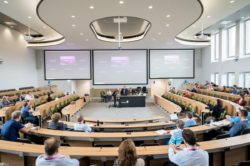IMC 2022: First Hybrid Event Success
The Leeds International Medieval Congress returned triumphantly to campus this July. Our first global, hybrid event brought in person and virtual participants together to discuss all things medieval, with a special thematic focus on ‘Borders’.

We were delighted to welcome delegates from 61 countries back to our city centre campus to enjoy a surprisingly temperate British summertime get-together as well as more than 600 sessions, featuring over 950 hours of the latest research in medieval studies. Around 60% of attendees travelled or participated from outside the UK. Hybrid activity also saw an improvement in the academic quality. When surveyed, 92% of attendees believed that the academic quality of papers at this year’s IMC was good or very good!
IMC 2022 saw 2,447 colleagues come together to share the latest research from across medieval studies. As our first fully hybrid event, we were delighted to welcome 78% of attendees in person, with the remaining 22% able to join virtually from around the world.
IMC 2022 utilised Pathable, the same virtual platform used for the wholly virtual IMC 2021, to provide a platform for all attendees to come together and watch sessions as they happened, whether they took place in one of 40+ rooms around campus or online.
To date, we are delighted that over 90% of registered attendees have made use of hybrid elements of the event, with the platform seeing over 200,000 individual page views. Despite making up only a quarter of attendees, virtual attendees attended, or watched recordings of, over 80% of sessions to date. We’ll provide a full round up of how the virtual platform was used via the News pages of our website in September after the platform has closed.
We were delighted to find that the majority of speakers and moderators were able to follow the advice on presenting for a hybrid audience – staying in sight of the camera on the podium and ensuring that they were clearly visible to remote audiences. These efforts were greatly appreciated, with one remote attendee telling us ‘the technology worked very well! Speakers by and large were audible’ though ‘those who moved their heads a lot’ or walked away from the podium were less popular with our virtual audience!
We appreciate the effort so many speakers and moderators took to ensure that participants in the room and at home were equally able to follow along with speakers’ presentations. IMC 2022 was a bold experiment given the number of wholly hybrid sessions running concurrently and we are pleased that the majority of sessions ran smoothly and without a hitch.
Looking to the future...
Our team are already making plans for next year’s Congress, where the special thematic focus will be ‘Networks and Entanglements’. We are delighted to welcome Johannes Preiser-Kapeller (Institut für Mittelalterforschung, Österreichische Akademie der Wissenschaften, Wien) to the Programming Committee to coordinate next year’s special thematic focus. You can read the Call for Papers for IMC 2023 on the back page of this newsletter.
It is our present intention that, like IMC 2022, IMC 2023 will be a hybrid gathering, enabling speakers to participate both in person and online. At submission, we will ask submitters whether the session or paper will be delivered in person or virtually.
Our Programming Committee will utilise these responses when reviewing proposals and creating the IMC 2023 programme. As in previous years, we hope to publish the final programme in December 2022, with registrations opening in February 2023. We expect that, like this year, allocation of physical spaces on campus will take place later than prior to the pandemic. This means that programme books will only be available on arrival on a pre-order basis for in-person attendees only.
As last year, we will notify speakers in December if their papers, sessions, and round tables have been accepted into the IMC programme. At this point, we will also be asking speakers to confirm their format of participation.
IMC 2022 saw an unprecedented number of late changes to the programme and this had an enormous impact on logistical arrangements. While we appreciate that last minute changes are inevitable – especially as a result of the uncertainty surrounding the ongoing coronavirus pandemic – we ask that all delegates do their best to let us know as soon as possible should their plans change.
Please note that we cannot guarantee that we can accommodate all last minute changes, especially after registration deadlines have passed and for sessions which are scheduled in spaces that cannot optimally support hybrid presentation. However, our team will do the best to facilitate format changes where necessary in coordination with session organisers.
